The chemical industry relies heavily on pumps for various fluid handling applications. Pumps play a crucial role in transferring, mixing, and processing chemicals throughout different stages of production. The diverse and often challenging nature of chemical substances necessitates the use of specialized pumps designed to handle corrosive, abrasive, toxic, and high-pressure fluids. In this article, we will explore some of the commonly used chemical industry pump.
1.Centrifugal Pumps:
Centrifugal pumps are widely used in the chemical industry due to their versatility, efficiency, and ability to handle a wide range of fluids. These pumps work by using a rotating impeller to create centrifugal force, which pushes the fluid through the pump. Centrifugal pumps can be constructed with various materials, including stainless steel, cast iron, or exotic alloys, to handle corrosive chemicals. They are suitable for applications such as liquid transfer, circulation, and chemical processing.
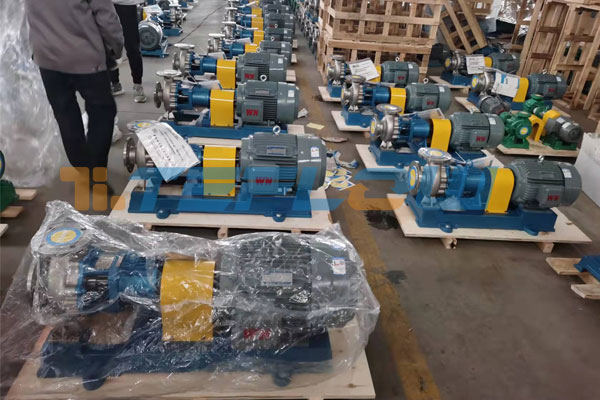
2.Diaphragm Pumps:
Diaphragm pumps, also known as membrane pumps, are popular in the chemical industry because of their ability to handle corrosive, abrasive, and viscous fluids. These pumps use a flexible diaphragm that moves back and forth to create a pumping action. Diaphragm pumps can be constructed with chemically resistant materials like polypropylene, PVDF, or stainless steel, making them suitable for handling aggressive chemicals. They are commonly used for metering, dosing, and transferring chemicals in a precise and controlled manner.
3.Magnetic Drive Pumps:
Magnetic drive pumps, or mag-drive pumps, are sealless pumps that use a magnetic coupling to transfer fluids. These pumps are widely used in the chemical industry for handling corrosive and toxic liquids. The absence of a mechanical seal eliminates the risk of leaks and ensures the integrity of the fluid being transferred. Magnetic drive pumps are available in materials such as polypropylene, PVDF, or stainless steel, providing excellent resistance to corrosion. They are commonly used for chemical transfer, reagent dosing, and circulation applications.
4.Progressive Cavity Pumps:
Progressive cavity pumps, also known as helical rotor pumps, are positive displacement pumps commonly used in the chemical industry. These pumps use a rotating eccentric screw inside a rubber or elastomeric stator to create a pumping action. Progressive cavity pumps can handle highly viscous, shear-sensitive, and abrasive fluids. They are suitable for applications such as transferring polymers, sludge, adhesives, and high-viscosity chemicals.
5.Peristaltic Pumps:
Peristaltic pumps are ideal for handling corrosive, abrasive, and sensitive chemicals due to their gentle pumping action and compatibility with a wide range of materials. These pumps use a rotating roller mechanism to compress and move a flexible tubing, which is the only part in contact with the fluid. The tubing can be made of materials like silicone, Viton, or PTFE, providing excellent resistance to chemical attack. Peristaltic pumps are commonly used for metering, sampling, and transferring chemicals in the chemical industry.
6. Air-Operated Double Diaphragm (AODD) Pumps:
AODD pumps are widely used in the chemical industry due to their versatility and ability to handle corrosive, viscous, and abrasive fluids. These pumps use compressed air to flex diaphragms that create a pumping action. AODD pumps can be constructed with chemically resistant materials like polypropylene, PVDF, or stainless steel. They are commonly used for chemical transfer, drum emptying, and sump drainage applications.
In conclusion, the chemical industry relies on a variety of pumps to handle the diverse and challenging fluids encountered during production processes. Centrifugal pumps, diaphragm pumps, magnetic drive pumps, progressive cavity pumps, peristalt ic pumps, and AODD pumps are just a few examples of the pumps used in this industry. Proper pump selection based on factors such as chemical compatibility, flow rate, pressure, and operational requirements is essential to ensure efficient, safe, and reliable fluid handling in the chemical industry.





 +86 18130251359
+86 18130251359 teflowpumps@tlpumps.com
teflowpumps@tlpumps.com

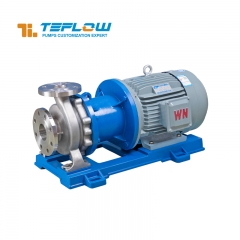
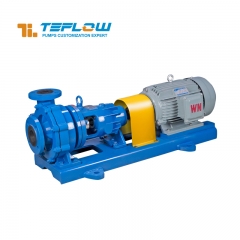
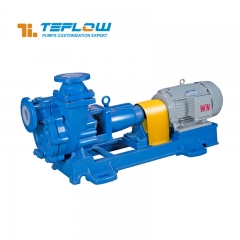
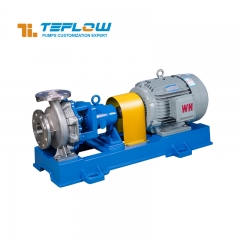








 +86+0563-5093318
+86+0563-5093318
